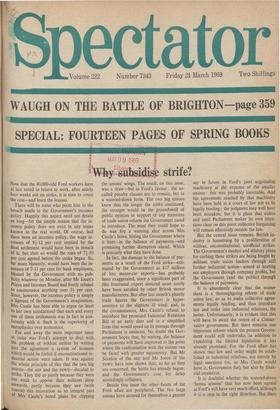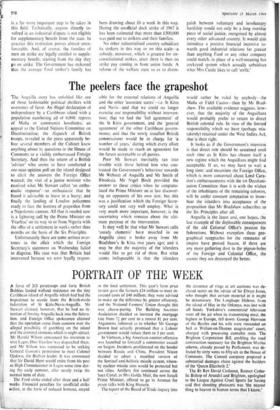4WhyLPgritbs X( strife?
Now that the 40,000-odd Ford workers have at last voted to return to work, after nearly four weeks out on strike, it is time to count the cost—and learn the lessons.
There will be some who. point first to the breach made in the Government's incomes policy. Happily this aspect need not detain us long—for the simple reason that the in- comes policy does not exist in any terms known to the real world. Of course, had there been an incomes policy, the wage in- creases of 81-12 per cent implied by the final settlement would have been in breach of it; but then so would the rises of 71-10 per cent agreed before the strike began. So. far more blatantly, would have been the in- creases of 7-11 per cent for bank employees, blessed by the Government with no pub- licity whatever on Monday, after Mr Jones's Prices and Incomes Board had firmly refused to countenance anything over 33 per cent. Since, however, the incomes policy is simply a figment of the Government's imagination, Mrs Castle has been able to argue (at least to her own satisfaction) that each and every one of these settlements was in fact in con- formity with it. Such is the superiority of metaphysics over economics.
Far and away the most important issue at stake was Ford's attempt to deal with the problem of wildcat strikes by writing into the agreement a system of bonuses which would be forfeit if unconstitutional in- dustrial action were taken. It was against the whole principle of this that the two big unions—the AEF and the TGWU—decided to strike. They did so partly because they were too weak to oppose their militant shop stewards, partly because they saw (with reason) this innovation as an integral part °f Mrs Castle's hated plans for clipping the unions' wings. The result, on this issue. was a draw—but in Ford's favour : the so- called penalty clauses are to remain, but in a watered-down form. The two big unions knew that the longer the strike continued. the stronger would be the groundswell of public opinion in support of any measures of trade union reform the Government cared to introduce. The most they could hope to do was fire a warning shot across Mrs Castle's bows, hitting the Government where it hurt—in the balance of payments—and promising further disruption ahead. Which is precisely what they have done.
In fact, the damage to the balance of pay- ments as a result of the Ford strike—esti- mated by the Government as f17 million of lost motor-car exports—has probably been exaggerated, since a significant part of this frustrated export demand must surely have been satisfied by other British motor manufacturers. But after last month's ghastly trade figures the Government is hyper- sensitive to the slightest ill wind; and, in the circumstances, Mrs Castle's refusal to introduce her promised Industrial Relations Bill at an early date and in a simplified form that would speed up its passage through Parliament is ominous. No doubt the Gov- ernment hopes that, by waiting. the balance of payments will have improved to the point where the confrontation with the unions can be faced with greater equanimity. But Mr Scanlon of the AEF and Mr Jones of the TGWU have now shown that, so far as they are concerned, the battle has already begun; and the Government's case for delay accordingly collapses.
Beside this issue the other facets of the Ford affair are peripheral. The two large unions have secured for themselves a greater say in future in Ford's joint negotiating machinery at the expense of the smaller unions: this was probably inevitable. And the agreements reached by that machinery have been held in a court of law not to be legally binding : the judgment may well have been mistaken; but it is plain that unless and until Parliament makes its own inten- tions clear on this point collective bargaining will remain effectively outside the law.
But the central issue remains. British in- dustry is hamstrung by a proliferation of wildcat, unconstitutional, unofficial strikes. The Government's modest and dilatory plans for curbing these strikes are being fought by militant trade union leaders through still further industrial action—aimed at hurting not employers through company profits, but the Government (and the public) through the balance of payments.
It is abundantly clear that the sooner there is a thoroughgoing reform of trade union law, so as to make collective agree- ments legally binding, and thus introduce law and order into industrial relations, the better. Unfortunately, it is evident that this will have to await the return of a Conser- vative government. But there remains one important reform which the present Govern- ment could still undertake, in addition to expediting the limited legislation it has already promised. For the Ford affair has shown that law and order might be estab- lished in industrial relations, not merely by legal sanctions (or, as Mrs Castle would have it, Government fiat), but also by finan- cial incentives. is a far more important step to be taken in this field. Technically, anyone directly in- volved in an industrial dispute is not eligible for supplementary benefit from the state. In practice this restriction proves almost unen- forceable. And, of course, the families of men on strike are legally entitled to supple- mentary benefit, starting from the day they go on strike. The Government has reckoned that the average Ford striker's family has been drawing about £6 a week in this way. During the unofficial dock strike of 1967 it has been estimated that more than £500,000 was paid out to strikers and their families.
No other industrialised country subsidises its strikers in this way or on this scale—a subsidy, moreover, which is greatest for un- constitutional strikes, since there is then no strike pay coming in from union funds. A reform of the welfare state so as to distin- guish between voluntary and involuntary hardship would not only be a. long overdue piece of social justice, recognised by almost every other advanced country. It would also introduce a positive financial incentive to- wards good industrial relations far greater than anything Ford or any other company could match, in place of a well-meaning but cockeyed system which actually subsidises what Mrs Castle likes to call 'strife.'











































 Previous page
Previous page